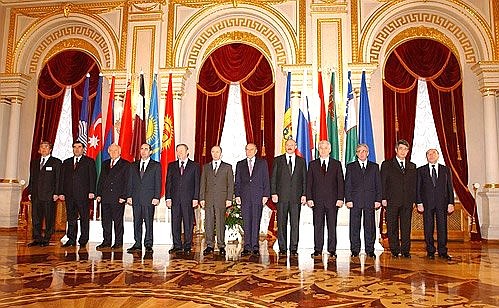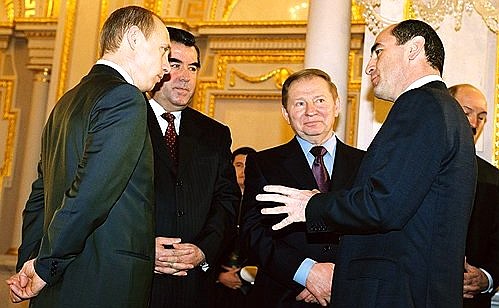The participants in the meeting discussed the prospects for developing integration within the CIS, economic and energy cooperation, pressing regional and international problems, and local conflicts on post-Soviet territory.
On Russia’s initiative, Ukrainian President Leonid Kuchma was elected chairman of the Council of CIS Heads of State.
The meeting was attended by the Presidents of eight Commonwealth countries: Russia, Azerbaijan, Moldova, Georgia, Tajikistan, Armenia, Belarus, and Ukraine, as well as Prime Ministers of Uzbekistan, Kyrgyzstan, Turkmenistan, and Kazakhstan’s Secretary-General.
Following the plenary meeting, President Putin told the journalists that Russia had confirmed its intention to create a free trade zone. The principal problem concerned paying the value added tax on the country of destination principle.
The President also expressed his opinion on the principles of peaceful settlement in Abkhazia and the problems related to the presence of the peacekeeping forces in the republic. He said Russia did not intend to extend the mandate of its peacekeeping forces, and once Georgia made a relevant request all the forces would be withdrawn from the republic. However, such a move could be followed by tragic events, and the situation in the region could worsen. The President expressed hope that the Commonwealth countries would consider the issue, and if with the consent of the Georgian leadership a compromise was found, Russia was ready to prolong the stay of its peacekeeping forces in the republic. He stressed that he was referring to the units which acted under the CIS aegis, rather than Russian peace-keeping forces.
Mr Putin commented on the mass applications for Russian citizenship by Abkhazians. He said 10 years ago, from 1993–1994, over 1 million Georgians immigrated to Russia, of whom 650,000 were granted Russian citizenship. “So why should we refuse to grant Russian citizenship to Abkhazians?” he said.
Answering the questions on the problems of Iraq, North Korea and the fight against international terrorism, the President said the CIS leaders held very close positions on these problems, which is a good basis for further cooperation.

